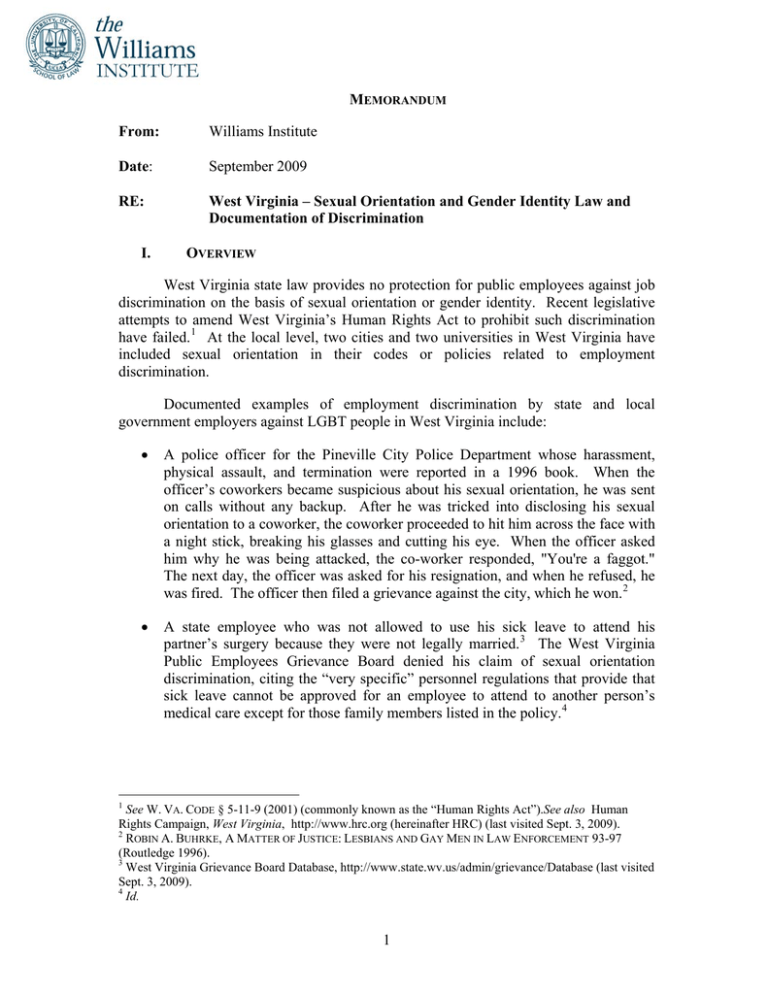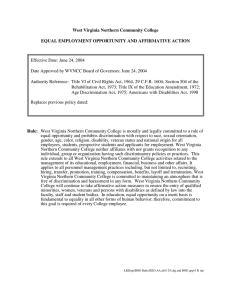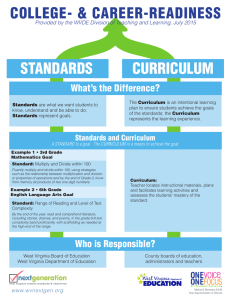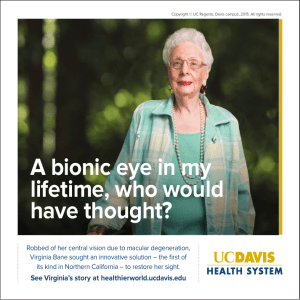
MEMORANDUM
From:
Williams Institute
Date:
September 2009
RE:
West Virginia – Sexual Orientation and Gender Identity Law and
Documentation of Discrimination
I.
OVERVIEW
West Virginia state law provides no protection for public employees against job
discrimination on the basis of sexual orientation or gender identity. Recent legislative
attempts to amend West Virginia’s Human Rights Act to prohibit such discrimination
have failed. 1 At the local level, two cities and two universities in West Virginia have
included sexual orientation in their codes or policies related to employment
discrimination.
Documented examples of employment discrimination by state and local
government employers against LGBT people in West Virginia include:
•
A police officer for the Pineville City Police Department whose harassment,
physical assault, and termination were reported in a 1996 book. When the
officer’s coworkers became suspicious about his sexual orientation, he was sent
on calls without any backup. After he was tricked into disclosing his sexual
orientation to a coworker, the coworker proceeded to hit him across the face with
a night stick, breaking his glasses and cutting his eye. When the officer asked
him why he was being attacked, the co-worker responded, "You're a faggot."
The next day, the officer was asked for his resignation, and when he refused, he
was fired. The officer then filed a grievance against the city, which he won. 2
•
A state employee who was not allowed to use his sick leave to attend his
partner’s surgery because they were not legally married. 3 The West Virginia
Public Employees Grievance Board denied his claim of sexual orientation
discrimination, citing the “very specific” personnel regulations that provide that
sick leave cannot be approved for an employee to attend to another person’s
medical care except for those family members listed in the policy. 4
1
See W. VA. CODE § 5-11-9 (2001) (commonly known as the “Human Rights Act”).See also Human
Rights Campaign, West Virginia, http://www.hrc.org (hereinafter HRC) (last visited Sept. 3, 2009).
2
ROBIN A. BUHRKE, A MATTER OF JUSTICE: LESBIANS AND GAY MEN IN LAW ENFORCEMENT 93-97
(Routledge 1996).
3
West Virginia Grievance Board Database, http://www.state.wv.us/admin/grievance/Database (last visited
Sept. 3, 2009).
4
Id.
1
WEST VIRGINIA
Williams Institute
Employment Discrimination Report
•
In 1983, the West Virginia Attorney General issued an opinion 5 that gay and
lesbian teachers could be fired by their districts under a state law that authorized
school districts to fire teachers for “immorality.”6 The Attorney General opined
that homosexuality was immoral in West Virginia even though the state
decriminalized same-sex sexual behavior in 1976. While the Attorney General
said homosexuality must be shown to affect the person’s fitness to teach, that
could be shown if the teacher was “publicly known to be homosexual” as
opposed to engaging in “private, discreet, homosexuality.” He also noted that
there were some jobs where “even such publicized sexual deviation” might not
interfere with employment in the public sector, such as “university drama
teacher(s)” and “custodians.”
•
A school teacher who brought a discrimination suit against her school board in
1986 after she resigned under duress. Her resignation came after years of public
and internal scrutiny following a rumor that she had been romantically involved
with another female teacher and complaints from the community that her manner
of dress was "too masculine." The school board asked her to appear and explain
her personal situation involving the other female teacher. She did, and assured
them that she was not involved in any inappropriate behavior. Later, she was
given an improvement plan that called for her to change her style of dress to
something more feminine, something that the kindergarten students would "be
comfortable with." Just prior to her resignation, approximately 400 people
appeared to protest her continued presence in the classroom. According to the
court, the public outcry arose because of the West Virginia Attorney General
opinion which stated that a school board could use public reputation in the
community to establish a teacher's homosexuality and could dismiss a “reputed
homosexual teacher” for immorality. A trial jury was held and the jury returned
a verdict for the board on Conway's claim of duress. The court of appeals
affirmed. Conway v. Hampshire County Bd of Educ., 352 S.E.2d 739 (W. Va.
1986).
Part II of this memo discusses state and local legislation, executive orders,
occupational licensing requirements, ordinances and polices involving employment
discrimination based on sexual orientation and gender identity, and attempts to enact
such laws and policies. Part III discusses case law, administrative complaints, and other
documented examples of employment discrimination by state and local governments
against LGBT people. Part IV discusses state laws and policies outside the employment
context.
5
60 W. Va. Op. Atty. Gen. 46, 1983 WL 180826 *1 (W.Va.A.G.), Office of the A. G.,W. Va. (Feb. 24,
1983) (“Sexual Offenses: A county board of education may dismiss a teacher who engages in sexually
deviant conduct if the teacher's conduct substantially adversely affects his fitness to teach.”)
6
CODE OF W. VA., Ch. 18A, Art. 2, § 8 (1931).
2
WEST VIRGINIA
Williams Institute
Employment Discrimination Report
II.
SEXUAL ORIENTATION AND GENDER IDENTITY EMPLOYMENT LAW
A.
State-Wide Employment Statutes
Currently, the state of West Virginia has not enacted laws to protect sexual
orientation and gender identity from employment discrimination. 7
B.
Attempts to Enact State Legislation
In the most recently adjourned legislative session, supporters of S. B. 600
unsuccessfully sought to amend the Human Rights Act, 8 the state’s existing nondiscrimination law, and the Fair Housing Act 9 to add sexual orientation and gender
identity or expression as protected categories. 10 The bill was introduced in the Senate,
passed in the Senate, and passed in the House Judiciary Committee, but did not come up
for a vote in the House and died when the legislature adjourned. The bill as passed in
the Senate defined sexual orientation as “heterosexuality, bisexuality, homosexuality or
gender identity or expression, whether actual or perceived.” 11 However, the House
Judiciary Committee passed an amended version of the bill which simply struck gender
identity or expression from the language of the introduced version of the bill. 12 The
West Virginia Human Rights Commission, which is statutorily authorized to make
recommendations on policies to the governor and Legislature in matters affecting human
rights voted to recommend passage of SB 600. 13
Similar bills were also introduced in the prior legislative session. H. B. 2860
was authored by House members Fleischauer, Doyle, Webster, Brown, Palumbo,
Guthrie, and Wells. H. B. 2860 would have added only “sexual orientation” to the
categories covered by the Human Rights Act, the state’s anti-discrimination statute. 14
There is very little information available related to the legislative history of the bill or
any commentary made by its supporters or detractors, except that the bill was introduced
and sent to the House Judiciary Committee, wherein no further action was taken. H. B.
2860 died when the 78th Legislature adjourned sine die. 15 Another bill from the same
legislative session, H. B. 4164 would have prohibited sexual orientation and age
7
Lambda Legal, West Virginia, http://www.lambdalegal.org/our-work/states/west-virginia.html (last
visited Sept. 3, 2009). The West Virginia unlawful discriminatory practice statute protects an individual
from discrimination on the basis of an individual’s race, religion, color, national origin, ancestry, sex,
disability or age. W. VA. CODE § 5-11-9(2) (2001)
8
W. VA. CODE § 5-11-9(2).
9
W. VA. CODE § 5-11A-1.
10
Human Rights Campaign, West Virginia SB 600 Page, http://www.hrc.org/issues/transgender/9334.htm
(last visited Sept. 3, 2009).
11
S.B. 600., 78th Leg., Gen. Sess. (W. Va. 2008)
12
Id. at H. Jud. Amendment.
13
ACLU of West Virginia, ACLU of WV Builds Senate Bill 600 Coalition, MOUNTAIN TORCH, Spring
2008, at 3 (citing W. VA CODE § 5-11-8(e)).
14
H.B. 2860, 78th Leg., Gen. Sess. (W.Va. 2008) (Fleischauer), text available at
http://www.legis.state.wv.us/Bill_Text_HTML/2008_SESSIONS/RS/Bills/hb2860%20intr.htm (last
visited Sept. 3, 2009).
15
Id.
3
WEST VIRGINIA
Williams Institute
Employment Discrimination Report
discrimination in the context of civil rights, government agencies and professional
occupations, it also failed to make it out of committee. 16
C.
Executive Orders, State Government Personnel Regulations, and
Attorney General Opinions
1.
Executive Orders
The research, including non-exhaustive research into secondary sources, did not
uncover any relevant executive orders.
2.
State Government Personnel Regulations
The West Virginia Public Employees Grievance Board (the “Board”) governs
grievance issues relating to state employees. 17 Covered employees include “any person
hired for permanent employment . . . for a probationary, full- or part-time position.”18
There are three levels to the grievance procedure, including an administrator review,
alternative dispute resolution, and a hearing with an administrative law judge. 19
The West Virginia University Board of Governors policy on Affirmative Action
and Equal Employment Opportunity is to “[r]ecruit, hire, train, promote, retain and
compensate all individuals in [listed] job titles without regard to . . . sexual orientation,”
among other protected categories. 20 The university also ensures that all personnel
actions will be administered without regard to immutable classifications, including
sexual orientation. 21 Marshall University has a similar policy. 22
3.
Attorney General Opinions
The research, including non-exhaustive research into secondary sources, did not
uncover any directly relevant attorney general opinions.
D.
Local Legislation
1.
City of Charleston
16
H.B. 4164, 78th Leg., Gen. Sess. (W. Va. 2008), text available
athttp://www.legis.state.wv.us/Bill_Text_HTML/2008_SESSIONS/RS/Bills/hb4164%20intr.htm (last
visited Sept. 3, 2009).
17
West Virginia Public Employees Grievance Board, Homepage, http://pegboard.state.wv.us (last visited
Sept. 3, 2009).
18
W. VA. CODE § 6C-2-2(e)(1).
19
Id. at §6C-2-4.
20
W. Va. Univ. Bd. of Govs. Pol’y 34: Affirmative Action and Equal Employment Opportunity § 2-1
(2006), available at http://bog.wvu.edu/r/download/4239 (last visited Sept. 13, 2009).
21
Id. at §§2-4.
22
See MARSHALL UNIVERSITY HUMAN RESOURCE SERVICES, CLASSIFIED STAFF HANDBOOK (n.d.),
available at http://www.marshall.edu/human-resources/handbook/EMPLOYMENT.HTM (last visited
Sept 14, 2009).
4
WEST VIRGINIA
Williams Institute
Employment Discrimination Report
The Charleston ordinance forbids discrimination in employment and housing
based on an individual’s sexual orientation. 23 Charleston’s ordinance describes sexual
orientation as “actual or perceived heterosexuality, bisexuality, or gender-related
identity, appearance or behavior of an individual, with or without regard to the
individual’s assigned sex at birth.” 24
2.
City of Morgantown
The Morgantown ordinance states that the city shall strive to eliminate all
discrimination in employment, housing, and places of public accommodations by virtue
of sexual orientation. 25 Morgantown defines sexual orientation as “having a preference
for heterosexuality, homosexuality, or bisexuality, having a history of such preference or
being identified with such preference.” 26
23
CHARLESTON MUN. CODE § 86-261 (2008).
Connie Weber, Sexual Orientation Law in Place in Charleston, W. VA. HUM. RESOURCES J.(Winter
2008).
25
MORGANTOWN MUN. CODE § 153.07 (2001).
26
Id. at § 153.02.
24
5
WEST VIRGINIA
Williams Institute
Employment Discrimination Report
III.
DOCUMENTED EXAMPLES OF EMPLOYMENT DISCRIMINATION AGAINST
LGBT PEOPLE BY STATE AND LOCAL GOVERNMENTS
A.
Case Law
1.
Public Employees
Conway v. Hampshire County Bd. of Educ., 352 S.E.2d 739 (W. Va. 1986).
In 1986, Linda Conway, an elementary school teacher, brought suit against the
school board after she resigned under duress. Her resignation came after years of
public and internal scrutiny following a rumor that she had been romantically involved
with another female teacher and complaints from the community that her manner of
dress was "too masculine." Just prior to her resignation, approximately 400 people
appeared to protest Conway's continued presence in the classroom. The public outcry
arose because of an Attorney General's opinion that a school board could use public
reputation in the community to establish a teacher's homosexuality and that the board
could dismiss a reputed homosexual teacher for immorality. A trial jury was held and
the jury returned a verdict for the board on Conway's claim of duress. The court of
appeals affirmed. 27
2.
Private Employees
Wamsley v. Lab Corp., 2007 U.S. Dist. LEXIS 71702, (N.D. W. Va 2007).
In Wamsley v. Lab Corp., 28 the federal district court for the Northern District of
West Virginia assessed whether a claim for sexual orientation discrimination was
actionable under the West Virginia Human Rights Act. The district court held that since
the West Virginia Supreme Court looks to the federal Title VII discrimination law in its
interpretation of the Human Rights Act provisions, and since Title VII jurisprudence
does not find sexual orientation discrimination to be actionable, the plaintiff’s complaint
did not state a claim. 29 The plaintiff had alleged that her supervisor “‘made comments
indicating that the Plaintiff is gay and treated her different [sic] because of that
belief.’” 30 The unpublished opinion does not contain any further facts which explore the
sexual orientation discrimination. 31
3.
Administrative Complaints
Research into the database of prior grievances by public employees includes one
file related to sexual orientation discrimination. In that grievance, an employee sought
27
Conway v. Hampshire County Bd. of Educ., 352 S.E.2d 739 (W. Va. 1986).
2007 U.S. Dist. LEXIS 71702 (N.D. W. Va. 2007).
29
Id. The court also stated that “there are no cases which cite discrimination based upon sexual
orientation as an actionable [Title VII] claim.” Id. at 7.
30
Id. at 5.
31
See id. at 4-5.
28
6
WEST VIRGINIA
Williams Institute
Employment Discrimination Report
to use his sick leave to attend his partner’s surgery. 32 The employee alleged that he was
discriminated against because he is gay. 33 Despite the fact that the employee had a
certificate of union from a church, he did not have a marriage license, which the Board
used as the justification for not allowing the employee to use his sick leave. 34 The
report cited the “very specific” personnel regulations that provide that sick leave cannot
be approved for an employee to attend to another person’s medical issues except for
those family members listed in the policy: such family members include spouses in
marriages recognized by the state, which, in turn, do not include same-sex unions. 35
C.
Other Documented Examples of Discrimination
Pineville City Police Department
Jim Blankenship, a gay man, worked as a police officer for the Pineville City
Police Department. When his coworkers were suspicious about his sexual orientation,
Blankenship was sent on calls without any backup. After Blankenship was tricked into
disclosing his sexual orientation to a coworker, his coworker proceeded to hit
Blankenship across the face with a night stick, breaking his glasses and cutting his eye.
As Blankenship arrested his coworker, he asked him why he did this, he responded,
"You're a faggot." The next day, Blankenship was asked for his resignation, and when
he refused, he was fired. Blankenship proceeded to file a grievance against the city,
which he won. However, even after leaving the police force, the city police continued to
harass Blankenship. He decided that he needed to move away from Pineville, and he
has decided not to work in law enforcement. 36
West Virginia Public Schools
In 1983, the West Virginia Attorney General issued an opinion 37 that gay and
lesbian teachers could be fired by their districts under a state law that authorized school
districts to fire teachers for “immorality.” 38 The Attorney General opined that
homosexuality was immoral in West Virginia even though the state decriminalized
same-sex sexual behavior in 1976. While the Attorney General said homosexuality
must be shown to affect the person’s fitness to teach, that could be shown if the teacher
was “publicly known to be homosexual” as opposed to “private, discreet,
homosexuality.” He also noted that there were some jobs where “even such publicized
32
West Virginia Grievance Board Database, http://www.state.wv.us/admin/grievance/Database (last
visited Sept. 3, 2009).
33
Id.
34
Id.
35
Id.
36
ROBIN A. BUHRKE, A MATTER OF JUSTICE: LESBIANS AND GAY MEN IN LAW ENFORCEMENT 93-97
(Routledge 1996).
37
60 W. Va. Op. Atty. Gen. 46, 1983 WL 180826 *1 (W.Va.A.G.), Office of the A. G.,
W. Va., (Feb.24, 1983) (“Sexual Offenses: A county board of education may dismiss a teacher who
engages in sexually deviant conduct if the teacher's conduct substantially adversely affects his fitness to
teach.”)
38
CODE OF W. VA., Ch. 18A, Art. 2, § 8 (1931).
7
WEST VIRGINIA
Williams Institute
Employment Discrimination Report
sexual deviation” might not interfere with employment in the public sector, such as
“university drama teacher(s)” and “custodians.”
8
WEST VIRGINIA
Williams Institute
Employment Discrimination Report
IV.
NON-EMPLOYMENT SEXUAL ORIENTATION AND GENDER
IDENTITY RELATED LAW
In addition to state employment law, the following areas of state law were
searched for other examples of employment-related discrimination against LGBT people
by state and local governments and indicia of animus against LGBT people by the state
government, state officials, and employees. As such, this section is not intended to be a
comprehensive overview of sexual orientation and gender identity law in these areas
A
Criminalization of Same-Sex Sexual Behavior
The West Virginia sodomy law was repealed in 1976. 39
B.
Hate Crimes
West Virginia’s hate crimes law does not explicitly include crimes motivated by
sexual orientation or gender identity bias.40 The protected classes under West Virginia’s
hate crimes law include race, color, religion, ancestry, national origin, political
affiliation, and sex. 41
C.
Education
West Virginia’s safe schools law is intended to protect students and to promote
the general welfare of the students in a non-threatening educational environment. 42 It
does not, however, specifically mention the bases of discrimination or harassment from
which the law intends to protect students. 43
Although not by a government actor, after the Supreme Court’s ruling in Boy
Scouts of America v. Dale, an editorial critical of LGBT rights appeared in Charleston
Daily Mail 44 penned by the head of the West Virginia Family Foundation, a
conservative organization seeking to promote “pro-family” values. 45 The editorial
rebuked United States Senator Jay Rockefeller for not supporting an amendment which
would functionally prohibit public schools from denying the Boy Scouts the ability to
meet on school grounds. The author stated that Rockefeller’s opposition to the
amendment was “raising the banner of tolerance for a lifestyle that civilizations down
through time have recognized as perverted and against nature itself. [Rockefeller has]
the gall to bring it into the schools where we send our children to get an education.” 46
The author further criticized the West Virginia Democratic Party Platform for 2000,
39
Laws of W. Va., Ch. 43 at 241(enacted Mar. 11, 1976, eff. June 11, 1976).
See W. VA. CODE § 61-6-21 (2001).
41
Id.
42
See id. at § 18-2C-1 et seq. (2001).
43
See id.
44
Kevin McCoy, Traditional Values are Being Attacked: There’s a Campaign to Marginalize the Boy
Scouts, CHARLESTON DAILY MAIL, July 14, 2001, at 5A (hereinafter “Traditional Values”).
45
Id.; West Virginia Family Foundation, Home Page, http://www.wvfamily.org (last visited Sept. 3,
2009).
46
McCoy, Traditional Values, supra note 44..
40
9
WEST VIRGINIA
Williams Institute
Employment Discrimination Report
which recognizes “homosexuality and other perverted sexual orientations as a civil
right.” 47
D.
Health Care
In West Virginia, except in certain circumstances, a same-sex partner is unable to
make medical decisions for his or her partner without an advance directive. 48 A samesex partner is only authorized to make medical decisions for an incapacitated partner
under certain circumstances and is only given such authority under the auspices of being
a “close friend” to the incapacitated person. 49 Even then, if the incapacitated person has
adult children or parents, the partner is not permitted to exercise the rights of a similarlysituated person whose partner is severely ill. 50 Moreover, if the same-sex partners do
have an advance directive drafted, they must ensure that it conforms to certain statutory
requirements. 51
E.
Parenting
1.
Adoption
As referenced above, West Virginia adoption laws permit any unmarried person,
or a husband and wife jointly, to petition to adopt a child. 52 There are no explicit
prohibitions against same-sex couples jointly petitioning to adopt or a same-sex partner
petitioning to adopt his or her partner’s child. 53 However, there have been no cases to
test these issues. 54 Moreover, there are no statutes or regulations that address whether
adoption proceedings may consider sexual orientation or gender identity as factors in the
adoption petition. 55
2.
Custody and Visitation
West Virginia case law suggests that courts will not consider a parent’s sexual
orientation in custody and visitation hearings, unless one party provides evidence that
the parent’s sexual orientation harms the minor child. 56 It appears, however, that gay
and lesbian parents have been treated differently than other parents when seeking
custody and visitation of their children.
47
Id.
See W. VA. CODE §§ 16-30-4; 16-30-8.
49
See id. at § 16-30-8.
50
See id.
51
W. VA. CODE § 16-30-4.
52
Id. at § 48-22-201.
53
Id.
54
Human Rights Campaign, West Virginia: West Virginia Adoption Law,
http://www.hrc.org/your_community/1122.htm (last visited Sept. 3, 2009).
55
Id.
56
Human Rights Campaign, West Virginia: West Virginia Custody and Visitation Law,
http://www.hrc.org/your_community/1125.htm (last visited Sept. 3, 2009); see W. VA. CODE § 48-9-102;
§ 48-9-401.
48
10
WEST VIRGINIA
Williams Institute
Employment Discrimination Report
In the mid-1980s, two lower court decisions restricted biological parents’
custodial and visitation rights due to their relationships with people reputed to be gay. 57
The state Supreme Court reversed these decisions on appeal and ruled that a relationship
with a gay, lesbian, or bisexual individual does not qualify as a “substantial change”
justifying a change in the custody arrangement between the two parents. 58
Similarly, the West Virginia Supreme Court has allowed a widowed same-sex
partner to petition for custody of her deceased partner’s child with whom the widow had
no biological or legal relationship. 59 As a result of the court finding that the widowed
partner could be considered a “psychological parent,” she had the right to petition the
court in the custodial proceedings for the infant son she and her partner had intended to
raise together. 60 The court limited its ruling, however, to emphasize that this type of
adjudication should be exercised with discretion and only used in such unusual or
extraordinary cases when intervention is likely to serve the best interests of the child. 61
The West Virginia Supreme Court agreed with the family court finding that the best
interests of the child would be served by awarding the widow custody of the child. 62
F.
Recognition of Same-Sex Couples
1.
Marriage, Civil Unions & Domestic Partnership
West Virginia does not provide marriage licenses or any type of relationship
recognition for same-sex couples, 63 and also does not recognize any form of same-sex
relationship that is treated as a marriage under the laws of another state.: 64 However, the
state does allow for a marriage license to be validly issued to a couple, composed of one
person who has completed gender-reassignment surgery and a partner of the same birth
sex. 65 This marriage is allowable because the State Registrar of Vital Statistics is
authorized to make amendments to birth certificates, including those of individuals with
court orders and a physician’s notarized statement that the individual has completed
gender-reassignment surgery. 66
G.
Other Non-Employment Sexual Orientation and Gender Identity
Related Laws
57
Human Rights Campaign, West Virginia: West Virginia Custody and Visitation Law,
http://www.hrc.org/your_community/1125.htm (last visited Sept. 3, 2009); see also M.S.P v. P.E.P., 358
S.E. 2d 442 (W. Va. 1987); Rowsey v. Rowsey, 174 W. Va. 692 (W. Va. 1985).
58
See Rowsey, 174 W. Va. at 692.
59
Clifford K. v. Paul S., 619 S.E.2d 138, 143 (W. Va. 2005).
60
Id. at 143.
61
Id. at 140.
62
Id. at 161.
63
W. VA. CODE § 48-2-603 (2003); Human Rights Campaign, West Virginia: Marriage/Relationship
Recognition Law, http://www.hrc.org/your_community/1133.htm (last visited Sept. 3, 2009).
64
W. VA. CODE § 48-2-603.
65
Id. at § 16-5-25; W. VA. CODE R. § 64-32-6 (2006); See also Lambda Legal Defense Fund, Sources of
Authority to Amend Sex Designation on Birth Certificates (2009), http://www.lambdalegal.org/ourwork/issues/rights-of-transgender-people/sources-of-authority-to-amend.html
66
W. VA. CODE § 16-5-25 (2006)
11
WEST VIRGINIA
Williams Institute
Employment Discrimination Report
West Virginia Code of Judicial Conduct
The West Virginia Code of Judicial Conduct mandates performance of judicial
duties to be free from bias or prejudice, including such proscribed conduct on the basis
of sexual orientation. 67
67
W. VA. CODE OF JUD. CONDUCT, Canon 3(B)(5) (2008).
12






